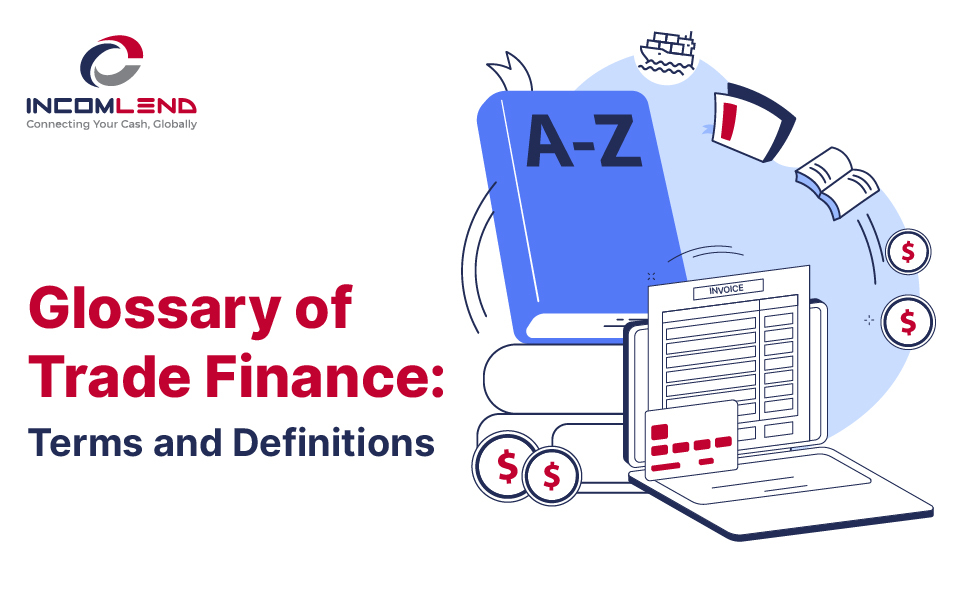Glossary of Trade Finance: Terms and Definitions
October 15, 2023
Trade finance is a complicated and multidimensional topic with specialised language that can be intimidating to newbies. In this blog post, we’ll demystify trade finance by giving a dictionary of key terminology and meanings, allowing you to more efficiently navigate the complex world of global commerce and finance.
Letter of Credit (LC): A financial instrument issued by a bank on behalf of a buyer (importer) to pay a seller (exporter) a particular sum if certain criteria are met. In international transactions, LCs provide security and trustOpen Account: A transaction in which products are transported and delivered before payment is received. The exporter believes the importer will pay at the agreed-upon future date.
Export Credit Insurance: A policy that protects exporters from non-payment by international purchasers. It guarantees that the exporter will be compensated even if the buyer fails to pay.
Importer of Record (IOR): The person or entity in charge of ensuring that imported products comply with all applicable rules and regulations. They are also obligated to pay import charges and taxes.
Bill of Lading (B/L): A legal document issued by a carrier (often a shipping business) to confirm the receipt of goods for transportation. It functions as both a receipt and a carriage contract.
Bank Guarantee: A guarantee given by a bank on behalf of a customer to assure that a contract will be fulfilled. It serves as a financial safeguard.
Risk Mitigation: The practise of reducing exposure to financial or operational risk in international trade, which is frequently accomplished through insurance, hedging, and other measures.
Forfaiting: A trade financing practise in which a forfeiter (often a bank or financial institution) purchases an exporter’s receivables at a discount, resulting in rapid cash flow.
Documentary Collection: A technique of trade payment in which a bank works as an intermediary to enable payment between an exporter and an importer based on the presentation of specific papers.
Incoterms: A collection of internationally recognised trade terminology that specify the responsibilities of buyers and sellers in international trade, such as FOB, CIF, and EXW.
Trade Finance Facility: A financial institution’s credit or financing arrangement to assist a company’s international trade activities, such as working capital loans and LCs.
Sight Draft: An instant payment demand, usually related with documentary collections. The importer must pay when the draught and related paperwork are presented.
Cross-Currency Swap: A financial arrangement in which participants swap one currency for another at a predetermined exchange rate and then reverse the transaction at a later date.
Eximbank: A government agency or financial organisation that provides trade financing solutions and export credit insurance to help a country’s exports and economic growth.
Due Diligence: The process of analysing and evaluating potential trade partners’ financial and legal backgrounds to ensure they are reliable and trustworthy.
Demurrage: Charges incurred when cargo is not unloaded from a vessel within the agreed-upon time frame, which is frequently due to delays or inefficiencies.
Force Majeure: A phrase in a commercial contract that exempts parties from contractual duties due to unanticipated occurrences such as natural disasters or political unrest.
Commercial Invoice: A document delivered by the seller to the buyer that details the products sold, their prices, and other transaction details.
Consolidation: The process of consolidating numerous smaller shipments into one larger package in order to save money on shipping.
Hedging: A financial strategy that helps to limit risk in international trade by protecting against unfavourable currency exchange rate swings.
ICC Rules: A set of standardised rules and guidelines established by the ICC to manage international trade practises, including the Uniform Customs and Practise for Documentary Credits (UCP 600).
When you understand the fundamental concepts, navigating the world of trade finance becomes less intimidating. This dictionary is an invaluable resource for anyone active in international trade or interested in learning more about the complex world of trade finance. Understanding these words will allow you to make more educated judgements, negotiate contracts, and manage the financial side of global trade more successfully.
